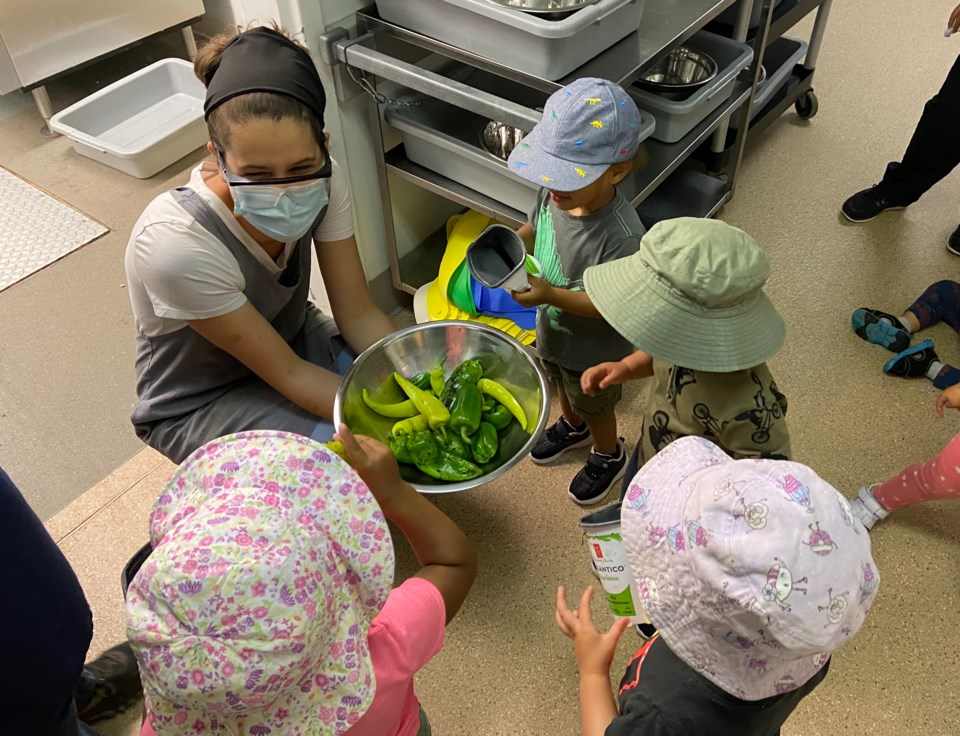Plant-based eating isn’t unfamiliar to folks shopping at grocery stores these days, but it is uncharted territory for childcare centres to implement an entirely plant-based menu.
The University of Guelph’s Child Care and Learning Centre is the first in Ontario and second in Canada to have a fully plant-based menu, said Valerie Trew, director of U of G’s child care centre.
While researching how the kitchen can be more efficient, safe and inclusive for staff and children, Trew knew plant-based was the way to go.
Trew has been vegetarian for years and before implementing the plant-based menu at the centre, she became vegan. In line with the menu, since there are no meat, fish or animal products in the meals anymore.
Many children at the centre have allergies to dairy products. By eliminating them, children could sit with anyone they wanted to because there was no fear of an allergic reaction or cross-contamination, Trew explained.
It worked for children who needed to eat Halal too, since no meat was involved.
What children like eating vegetables? Turns out many of them do, and Trew said there is no such thing as a picky eater.
A new food has to be introduced at least 15 times to see if a child likes it or not, she said.
“We don't really need to hide anything. They eat quinoa, kale salad. They have rainbow power bowls, full of cabbage, pickled onions, and edamame,” Trew said.
Introducing children to new foods now, while they are open to it, is crucial, she said.
Some examples of the types of food they serve are a chia seed, coconut pudding, rice jolof with plantains, cabbage and banana oat powerballs.
Part of a healthy eating environment is the division of responsibility of feeding. The adults are responsible for what, where and when the children eat. The children are responsible for if and how much they eat, said Trew.
At the centre, everyone eats family style with staff and children eating at the same time, at the same table.
The centre’s health unit at the time was following the old Canada’s food guide, it needed to go through a nutritional analysis, conducted by a practicum student in the university’s nutrition department.
The plant-based menu is in line with the revised 2019 food guide, said Trew.
The results were positive and met the nutritional needs of children. The only vitamin lacking was vitamin D. The menu added plant-based milk, oat milk, to supplement the vitamin.
Without meat, there is no lack of protein. It is consumed through tofu, legumes, beans and lentils in the menu.
To introduce the idea of a plant-based menu, Trew mentioned it to prospective parents whose names were on the waiting list for a spot at the centre because she knew it would take awhile to implement.
There was only pushback from a few families. It was an educational opportunity where Trew was able to back up the nutritional evidence with an an online certificate her and the centre's cook Elyse Serediuk completed.
With nutritional benefits from a plant-based menu, there were also ecological and sustainability benefits that came along with it.
The centre saw a 64.7 per cent decrease in their carbon footprint, monthly, according to a report from Foodsteps. This is a carbon savings of 1,963 kilograms of CO2 per month.
“As an early learning program it's hard for us to claim to care about children if we're not caring for their planet,” said Trew.
As she learned more about the ecological impact of animal products it became clear a plant-based menu was not only good for the children’s health but their environment too.
“The cost of everything has gone through the roof,” said Trew.
This didn't stop the centre from saving money from switching to plant-based. There was also a reduction in food waste, which wasn't measured but noticed anecdotally by Trew and her staff. The scraps from the food is used as compost for their community garden.
Comparing September to December of 2019 and September to December of 2020, the centre saw almost a 10 per cent decrease in food cost.
“We've been plant based for two years. It's part of who we are. So parents come knowing that about us,” said Trew.



